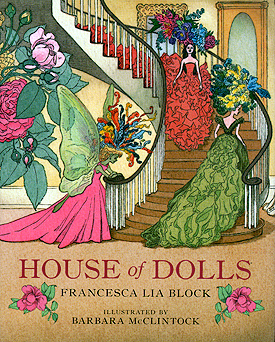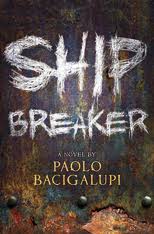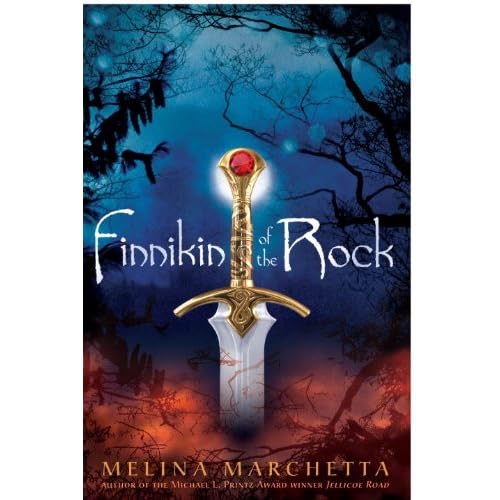
Sunday, September 26, 2010
The Red Blazer Girls: The Vanishing Violin by Michael Beil

Friday, September 24, 2010
One Crazy Summer by Rita Williams-Garcia
 (Alison reviewed this one back in February).
(Alison reviewed this one back in February).The thing that impressed me most about this book was Delphine’s voice (what a voice!). Delphine had me on the very first page. I loved that we got all her inner dialogue that just told it like she saw it, because when she spoke aloud her thoughts were edited so that she could protect and guide her sisters. She’s a smart girl who is super observant of her environment and even when she didn’t fully understand all the undercurrents I was always confident that she would figure it out (along with a little help from Ms. Merriam Webster of course).
I really liked how race relations were handled in this book. You’ve got black/white, shown by interactions with the white people in the airport/the hippies/the shopkeeper in San Francisco. You’ve got black/asian shown by Mean Lady Ming and Hirohito and his mom. And you’ve got black/black shown by Big Ma’s/Papa’s perspective vs. the Black Panther’s views. It made for a really rich exploration that was both subtle and respectful. And it seemed as though it was very true to the time period that it was set in. That was a very turbulent and exciting time of change and it made for an excellent backdrop.
I loved how Williams-Garcia was able to weave the political into the story. Even though this is a historical fiction, I think it is completely relevant to modern-day kids. So many of the things that Delphine took away from her summer with the Black Panthers are still completely applicable today. Communities are stronger if they organize, the system doesn’t always have everyone’s best interests in mind, you can choose to support businesses that support the community, you should be proud of your heritage, and no one is a second class citizen.
The personal was also handled wonderfully. Delphine’s family is fractured. Her mom left shortly after the youngest of the three sisters was born and even though they are fairly happy well-adjusted girls there is definitely a hole in their lives. I found the way that Celine, their mother, was written to be incredibly interesting. This is no story of a heartwarming reunion where the mother regrets leaving them, which truthfully I was sort of expecting. Instead, when the moment of resolution comes, Delphine gets an understanding of her mother’s circumstances that is different and too much to handle. I liked that it made Delphine mad, that it was obvious to her that she deserved more, while it also helped her to accept her mother and her mother’s limitations. I thought it was powerful.
In short, I loved it. Great pick for our Mock Newbery.
=====================================
Book Source = Library Copy
Thursday, September 16, 2010
House of Dolls by Francesca Lia Block and Barbara McClintock

When I heard Francesca Lia Block wrote a middle grade/juvenile book I immediately wanted to read it. Her magic-realism LA punk fairy contemporary fantasies don't have wide appeal, but those of us who get it sure do love it.
House of Dolls is an honest to goodness sweet little book. Barbara McClintock's fabulous illustrations are a welcome and wonderful bonus. There's a whimsical French feel to her drawings which adds to the fashion fabulousity of Block's living doll house tale. The book design is enough of a reason to pick the title up and give it a whirl and the page count barely reaches 61.
Madison Blackberry is a young girl who has everything but friends and affection from her parents. She inherited a fantastic doll house that belonged to her grandmother complete with a real bonsai tree, a lake (made from an old mirror), and trunkfulls of exquisite clothes for the 3 doll inhabitants. Madison is an unhappy girl and she reflects this unhappiness on her dolls. There's happiness in the end when the adults finally take notice of our Madison (with help from the dolls and grandma) and she in turn returns that happiness back to the dolls.
Block's usual themes of unconditional love and acceptance fill the story. Young girls who would rather take fashion advice from Tavi than what the Disney Channel churns out would make likely candidates for this book.
source: checked out from my library
Monday, September 13, 2010
Ship Breaker by Paolo Bacigalupi
 This is how it is done people. This is how you write a dysptopia. Just the right amount of world building (what little he does goes a long way. It is remarkable), awesome characterization, tight writing with no padding, and the slang. I LOVE the slang. And I love the names. In fact I think it would be safe to say that I pretty much love everything about this book.
This is how it is done people. This is how you write a dysptopia. Just the right amount of world building (what little he does goes a long way. It is remarkable), awesome characterization, tight writing with no padding, and the slang. I LOVE the slang. And I love the names. In fact I think it would be safe to say that I pretty much love everything about this book.I thought I had written about this before, but I couldn't find my post so I must not have (edited to add: I wrote a lame haiku). I would've liked to compare my first impressions with my second read of the book. I know I really liked it the first time and I think I loved it even more when I finished it for the second time. I couldn't help but compare it to Finnikin which I just wrote about. In every way Ship Breaker put Finnikin to shame (and I say that while still liking Finnikin FYI). The writing in this is really spare and to the point and totally effective. We don't know much about the wider world where this story is set, but we don't need to. We know everything we need to know in order for this story to work, nothing extra. The violence is just as evident and in your face but somehow managed to avoid being graphic and over the top. The dialogue was totally believable and that dang slang...honestly, incredible. I think I'm going to tell people to crew up. We'll see how that goes over at the next staff meeting.
This is a future where people live on beaches making shacks out of anything they can scavenge. Category six hurricanes, or city killers, are common. People's work crews are everything. In Nailer's world you're either small enough for light crew or you better hope you're big enough to fight for a spot on heavy crew. Either way the window for work is small and you better be loyal and reliable and hard working. Trust is everything. Break a blood oath and you'll get a knife through your work tattoos marking you as an oath breaker.
There are environmental themes, this is very much a commentary on where our reliance on oil is going to lead us. Themes of class division, morals and humanity, family, loyalty, and some genetic engineering thrown in to round us out (I am dying to learn more about Tool).
Tuesday, September 7, 2010
Finnikin of the Rock by Melina Marchetta
 First Impressions. I read this book again in anticipation of our Mock Printz.
First Impressions. I read this book again in anticipation of our Mock Printz.Usually I write notes as I read, for some reason though, this time I guess I was feeling lazy because I waited until the end to write anything. I'm sure we'll all suffer because of that haha.
My first thoughts were basically about how dense this story is. To take a look at the book you might not think it was too long (it clocks in at around 400 pages which is nothing to snear at) but I swear by the time you're done you'll be convinced you read at least 800 pages. If not more. This sucker reads like a multi-volume epic. I mean there is just a lot of stuff going on in this book. I don't necessarily mean that in a bad way, but I did feel a bit like I had been put through the wringer.
This is probably the grittiest YA fantasy I have ever read. Think The Road for teens if The Road had a bit less baby eatin' and a bit more rape and pestilence with a sprinkle of hope mixed in (hey, both are journeys...hahaha..er). Honestly? The book is bleak. Now is this a bad thing? I don't think so. I thought it was a great strength of the novel. This is not a book to glorify violence, nor is it a book to shy away from showing the results of violence. At times that makes it a difficult read, but perhaps more worthy for that.
The dialogue was a bit meladramatic at times, a little flowery and the characters said things that I had a hard time believing would ever come out of anyone's mouth ever. But I'll tell you what, I knew what was going to happen this time and I still couldn't put it down.
Looking over my first review I still had a major "what the what?" moment when the narration cuts unexpectedly away from Finniken to Froi for one chapter. For 239 pages we've been clearly been following Finniken. Then for one single chapter we follow Froi. Talk about jarring. That part did not get better on the second read.
All in all though, this is a real good one.
========================================
Book Source: Personal Copy


